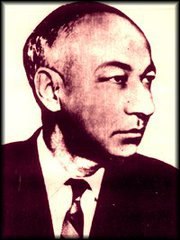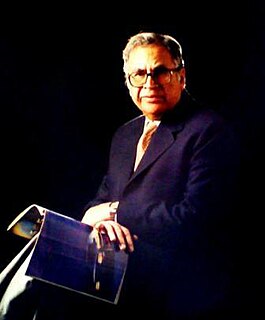 W
WManzoor Ahmed, DSc is a Pakistani scientist and philosopher of science. He is a professor of philosophy and is currently serving as rector of Usman Institute of Technology (UIT) in Karachi, Sindh Province. He has international prestige for publishing articles, books, and leading edge research on the field of Philosophy of science, particularly the philosophy of space and time.
 W
WIsrar Ahmed was a world renowned Pakistani Islamic theologian, philosopher, and Islamic scholar who was followed particularly in South Asia as well as by South Asian Muslims in the Middle East, Western Europe, and North America.
 W
WShamsuddin Azeemi is a Pakistani scholar in the field of spiritualism. He is the current head of the Azeemia Sufi order. He has written books on the subject of spirituality or Muraqaba and is the chief editor of the monthly Roohani Digest in Karachi, Pakistan. Moreover, he has established a chain of fifty-three Muraqaba halls worldwide.
 W
WIbrahim Ismail Chundrigar, best known as I. I. Chundrigar, was the sixth Prime Minister of Pakistan, appointed in this capacity on 17 October 1957 until being removed due to the vote of noconfidence movement on 11 December 1957.
 W
WSyed Hussain Jaun Asghar Naqvi, commonly known as Jaun Elia, was an Indo-Pak Urdu poet, philosopher, biographer, and scholar. He was the brother of Rais Amrohvi and Syed Muhammad Taqi, who were journalists and psychoanalysts. He was fluent in Urdu, Arabic, English, Persian, Sanskrit and Hebrew. One of the most prominent modern urdu poets, popular for his unconventional ways, he "acquired knowledge of philosophy, logic, Islamic history, the Muslim Sufi tradition, Muslim religious sciences, Western literature, and Kabbala."
 W
WSyed Zafarul Hasan was a prominent twentieth-century Pakistani Muslim philosopher.
 W
WAkhundzada Mohammad Abdul Ghafoor Hazarvi was a Muslim theologian, jurist, and scholar of ahadith in Pakistan. He was active in the Pakistan movement, member of Council of Islamic Ideology. He was the companion of Muhammad Ali Jinnah and separatist leader Maulana Zafar Ali Khan and was active in the independence movement of Pakistan against the British Raj. He was a Sufi of the Chishti Sufi order and the founding member of the religious Barelvi Sunni strain political party Jamiat Ulema-e-Pakistan (JUP). He became its president in 1948. He was also a political figure in Pakistan and was the first recipient of Nishan-e-Imtiaz by the President of Pakistan. He was also the chairman of Majlis-e-Tahaffuz-e-Khatme Nabuwwat, an organisation opposed to the Ahmadiyya Movement that waged a campaign against Mirza Ghulam Ahmed's claim of prophethood.
 W
WSenior Justice Javed Iqbal was a Pakistani philosopher and senior justice of the Supreme Court of Pakistan. He was internationally known for his acclaimed publications on philosophy of law and modern Islamic philosophy in international and national journals.
 W
WSyed Ali Abbas Jalalpuri was a professor of philosophy in Government College Lahore. He is regarded by the intellectuals of Pakistan as the Will Durant of Pakistan. He had master's degrees in Philosophy, Persian and Urdu. He wrote more than fourteen books on Philosophy, History, and Religion in Urdu language. He was known as a first-rate scholar, and his books seemed to herald an age of reason in Pakistan.
 W
WTalib Jauhari was a Pakistani Islamic scholar, poet, historian and philosopher of the Shia Sect of Islam.
 W
WAbul A'la Maududi was a colonial Indian and Pakistani Islamist, Muslim philosopher, jurist, historian, journalist, activist and scholar. Described by Wilfred Cantwell Smith as "the most systematic thinker of modern Islam", his numerous works, which "covered a range of disciplines such as Qur’anic exegesis, hadith, law, philosophy and history", were written in Urdu, but then translated into English, Arabic, Hindi, Bengali, Tamil, Telugu, Kannada, Burmese, Malayalam and many other languages. He sought to revive Islam, and to propagate what he understood to be "true Islam". He believed that Islam was essential for politics, and that it was necessary to institute sharia and preserve Islamic culture similar to the reign of Mughal Emperor Aurangzeb and abandon immorality, from what he viewed as the evils of secularism, nationalism and socialism, which he understood to be the influence of Western imperialism.
 W
WChief Justice Hamoodur Rahman, NI. HI, was a Pakistani Bengali jurist and an academic who served as the Chief Justice of Pakistan from 18 November 1968 till 31 October 1975.
 W
WSir Mian Abdul Rashid, KCSI was the first Chief Justice of Pakistan, legal philosopher, one of the founding fathers of Pakistan, and a jurist.
 W
WRiazuddin, also spelled as Riaz-Ud-Din, was a Pakistani theoretical physicist, specialising in high-energy physics and nuclear physics. Starting his scientific research in physics in 1958, Riazuddin was considered one of the early pioneers of Pakistan's nuclear weapons development and atomic deterrence development. He was the director of the Theoretical Physics Group (TPG) of the Pakistan Atomic Energy Commission (PAEC) from 1974 until 1984. Riazuddin was a pupil of the winner of the 1979 Nobel Prize in Physics, Abdus Salam.
 W
WShaikh Muhammad Sharif Sabir, better known as Sharif Sabir, was a Pakistani-Punjabi scholar, poet, researcher and educationist who is widely known for editing the most authentic version of Heer Waris Shah published in 1985. It took him over ten years to complete this work. Earlier, he had already written a book of poetry and edited Puran Bhagat of Qadir Yar, and translated parts of Gulistan and Bustan of Saadi Shirazi into Punjabi. He edited Sultan Bahu’s poetry collection Abiat-e-Bahu, Mian Mohammad Bakhsh's monumental work of Saiful Muluk, the poetry of Bulleh Shah and had just completed editing of the poetry of Baba Farid before his demise. Being also a scholar of Persian and Arabic, he undertook a Herculean translation of Ali Hajweri Gunj Bakhsh’s Kashf ul Mahjoob from Persian to Urdu. He was commissioned by the Punjab Auqaf Department.
 W
WPeer Syed Ghulam Mohiyuddin Gilani, commonly called Babuji, was a Sufi scholar from Golra Sharif, Pakistan belonging to the Chishti order. He was the son of Peer Meher Ali Shah and remained the sajjada nashin of the Golra Sharif shrine from 1937 to 1974.
 W
WWasif Ali Wasif was a teacher, writer, poet and sufi intellectual from Pakistan. He was the son of Muhammad Arif. Wasif Ali Wasif received his early education from Khushab before going to Jhang where he passed matriculation, intermediate and bachelors in the first division.